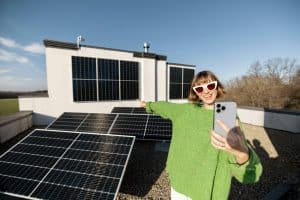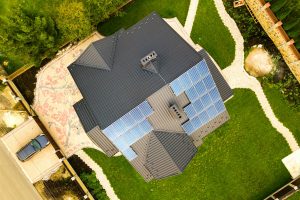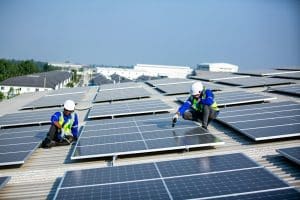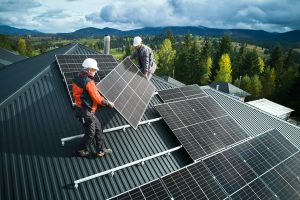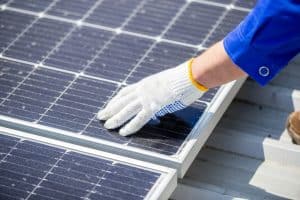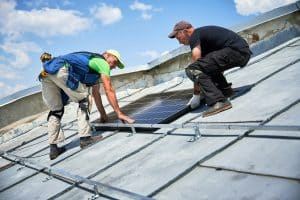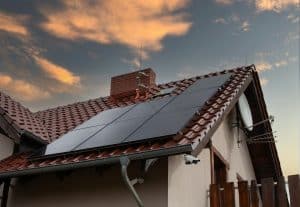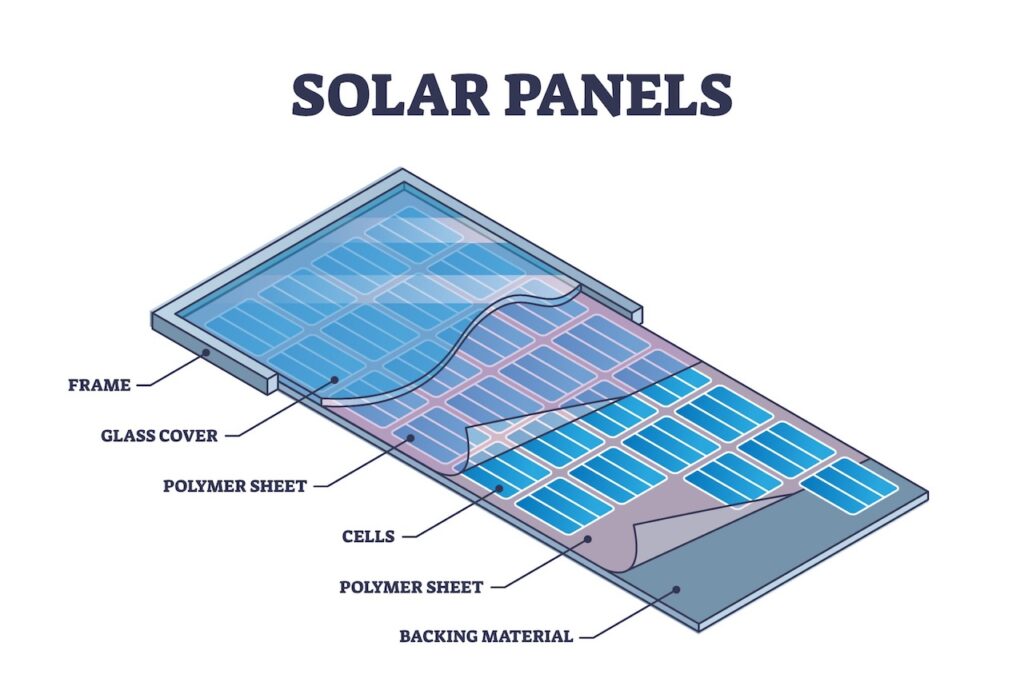
The world is moving towards cleaner energy, and solar power is leading the way. At the heart of this movement are PV (photovoltaic) panels. Many people ask: What are PV panels made from, and how do they work?
In this blog post, we’ll explore what solar panels are made of and how they work. We’ll also look at the materials used in solar panel batteries. You’ll learn about their size, lifespan, and energy storage. This will help you make a smart choice about solar energy.
Solar Panels: What Are They Made Of?
To understand how solar panels work, we need to know what they’re made of.
Core Components of Solar Panels:
- Silicon Cells: These are the heart of PV panels. Silicon is a special material that turns sunlight into electricity.
- Glass Sheet: This layer protects the silicon cells from damage like hail or wind.
- Encapsulant: These are plastic layers that keep the silicon wafers safe from moisture.
- Backsheet: This layer keeps the panel’s inside safe from the weather.
- Frame: The frame is usually made of aluminum. It supports the panel and makes it easy to install.
- Junction Box and Wiring: This is where the electrical connections are made. It lets the current flow to the rest of the system.
These parts are put together to make a strong, efficient solar panel. It can last over 25 years with little upkeep.
What Are PV Solar Panels Made Of?
PV stands for photovoltaic. It’s the technology that turns sunlight into electricity using special materials.
Primary Material: Crystalline Silicon
Most PV panels use crystalline silicon. There are two main types:
- Monocrystalline Silicon: Made from a single crystal. These panels are more efficient but cost more.
- Polycrystalline Silicon: Made from silicon pieces melted together. They’re cheaper but less efficient.
Other Materials in PV Panels:
- Conductive Metals: Like silver or copper, used for electrical connections.
- Anti-reflective Coating: This coating helps the panel absorb more sunlight.
- Glass and Polymer Layers: These protect the panel from weather and damage.
These materials are chosen for their efficiency, durability, and green benefits. PV panels are a reliable source of renewable energy today.
What Are Solar Panel Batteries Made Of?
As solar tech gets better, storing energy is key. So, what are solar panel batteries made of, and why are they important?
Types of Solar Batteries:
- Lithium-Ion Batteries(most common):
- Materials: Lithium, cobalt, nickel, manganese.
- Benefits: Lightweight, efficient, longer life span, faster charging.
- Lead-Acid Batteries:
- Materials: Lead plates and sulfuric acid.
- Benefits: Lower cost, reliable for off-grid systems.
- Saltwater Batteries(emerging):
- Materials: Sodium and water-based electrolytes.
- Benefits: Non-toxic and environmentally friendly.
Why Battery Composition Matters:
The materials in solar batteries affect their efficiency, cost, and environmental impact. Lithium-ion batteries are popular for homes and businesses because they last long and are compact.
What Size Are Solar PV Panels?
Knowing the size of solar PV panels is key when setting up a solar system at home or work.
Standard Sizes:
- Residential Panels:
- Average size: 65 inches x 39 inches (5.4 ft x 3.25 ft)
- Power output: 250–400 watts
- Commercial Panels:
- Average size: 78 inches x 39 inches (6.5 ft x 3.25 ft)
- Power output: 400–600+ watts
Factors That Affect Panel Size:
- Energy Needs: More panels or higher output are needed for higher consumption.
- Roof Space: The number of panels depends on available space and layout.
- Panel Efficiency: More efficient panels produce more electricity in less space.
Understanding PV panel size ensures your system meets your energy needs.
Why It Matters: Materials, Efficiency & Sustainability
Investing in solar panels means adopting a long-term energy solution. The materials in your panels and batteries affect performance, lifespan, and environmental impact.
Choosing high-quality materials (like monocrystalline silicon and lithium-ion batteries) ensures:
- Greater energy efficiency
- Lower maintenance costs
- Better resistance to weather
- Higher return on investment
Ready to Go Solar? Partner with a Trusted Solar Energy Company
At Depth of Light Ltd, we’re dedicated to delivering premium solar panel systems made from top materials. Whether you’re curious about solar panels or ready to install a solar + battery system, our experts are here to guide you.
Why Choose Us?
- Certified, licensed installers
- Free consultation and site analysis
- Transparent pricing and high-performance products
- Full support for battery storage and off-grid solutions
Conclusion
Understanding what PV panels are made from leads to better choices. They are great for homes, businesses, or cabins. Solar tech is clean, efficient, and lasts a long time.
Start your solar journey today—contact us for a free quote and discover how clean energy can power your future.
Frequently Asked Questions (FAQs)
Do solar panels work during cloudy days or at night?
Solar panels work on cloudy days, but not as well. They make 10–25% of their usual power. At night, they don’t work, but a solar battery storage system lets you use stored energy.
Can I recycle solar panels and batteries?
Yes, you can recycle solar panels and batteries. Materials like glass, aluminum, and certain metals can be reused. More companies and governments are starting solar recycling programs to help the planet.
What’s the difference between PV panels and solar thermal panels?
- PV Panels turn sunlight into electricity with silicon.
- Solar Thermal Panels warm water or air with sunlight for use at home or work.
For making electricity, PV solar panels are the best choice.


